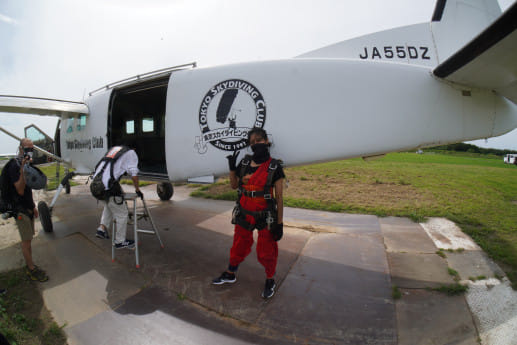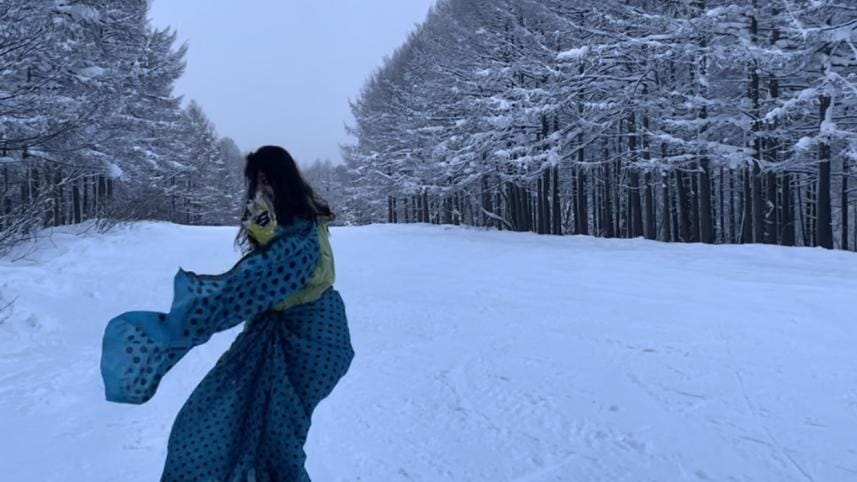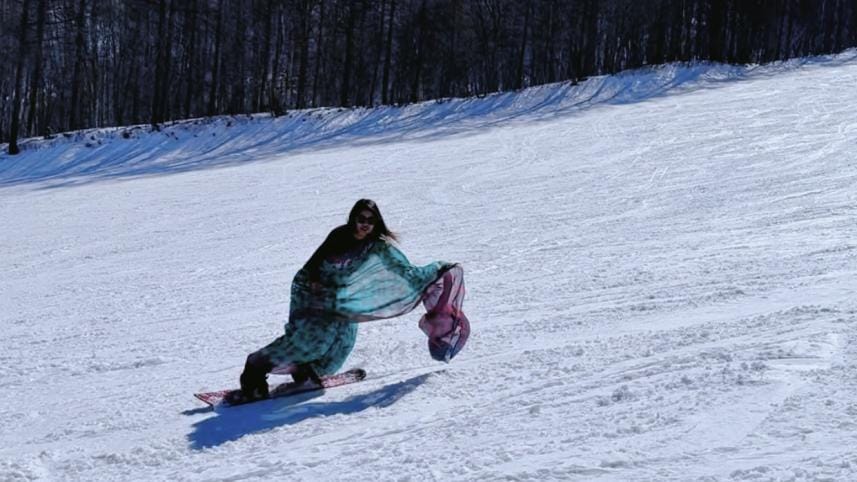Afsana Begum on conquering the world of extreme sports in saree

For generations, the saree has symbolised grace and tradition, elegantly draped in ceremonial splendour across South Asia. Yet, this iconic six-yard fabric is hardly the apparel of choice for adrenaline-fueled escapades such as snowboarding and skydiving. Afsana Begum, a doctoral student at Chiba University in Japan, is redefining this perception – demonstrating the saree's strength and versatility in the daring world of extreme sports while proudly showcasing her cultural heritage.
So, what inspired her to take up extreme sports in saree?
Afsana's entry into extreme sports was driven by a desire to challenge and transform societal perceptions of traditional attire. She recalls her friends' inconvenience about wearing sarees for practical activities like cycling.
"They found sarees inconvenient, especially for everyday activities that required mobility. I wanted to show that our traditional attire could be part of extraordinary activities," she says.

For her 30th birthday, Afsana chose to defy these norms dramatically – by skydiving in a saree! "It was about proving that turning 30 is just the beginning and showing how gracefully a saree can take on challenges," she reflects.
From cycling kilometres to her university to confidently gliding along icy slopes, Afsana has consistently demonstrated that a saree is not a barrier but a badge of identity and strength. "The saree has always been a symbol of power to me," Afsana shares, recalling how women have worn the garment throughout history during significant cultural and political movements in South Asia.

Embracing challenges with grace
Contrary to what one might expect, Afsana found Japan more accommodating for her adventurous pursuits in traditional attire than her home country, Bangladesh. She notes, "The level of respect on public transport and the availability of facilities for changing made it easier to engage in extreme sports while wearing a saree." This contrast with her experiences in Dhaka, where safety and convenience issues often arose, only strengthened her resolve.

Her journey with the saree began during her undergraduate days as a Dhaka University student. She encouraged her peers to embrace traditional attire for presentations. Despite the reluctance she faced, Afsana continued to advocate for the saree's versatility, which she believes offers unparalleled fluidity when unstitched.
What about safety concerns?
Safety is paramount in extreme sports. To address the safety concerns posed by wearing a saree during extreme sports, Afsana works closely with her instructors to modify her attire without compromising safety protocols. This has allowed her to continue pursuing her passion without risking her well-being.

"During skydiving, I secured the anchal with a belt and wore jeans instead of a petticoat. I shortened the anchal for snowboarding so it wouldn't interfere with my movement. I also wore heated gear to stay warm," she details. This careful modification allows her to maintain cultural authenticity while ensuring safety.
Inspiring awe and change
The response to Afsana's sporting endeavours in a saree has been overwhelmingly positive, sparking curiosity and admiration worldwide. "People are generally amazed and appreciate the vibrant colours. Once, I encountered a Japanese couple who were snowboarding in kimonos, which shows that cultural attire can be part of any passion," she shares. This challenges the conventional view that sports require a specific uniform, encouraging a more inclusive perspective.

A vision for the future
Looking ahead, Afsana is eager to push even more boundaries. "I'm considering marine sports next, like water skiing or surfing in a saree," she reveals, excited about the prospect of continuing to blend cultural heritage with cutting-edge sports. She aims to inspire others to embrace their traditions in modern, unconventional ways, thus enriching the global tapestry of cultural expressions.
Dedicated to empowering others, Afsana encourages women to explore extreme sports while embracing their cultural attire. "It's important for individuals to make their own choices, but if I can inspire someone to step out of their comfort zone and try something new, I believe it can lead to profound personal growth," she says.
As women worldwide, like Afsana Begum, continue to break barriers and reach new heights, let us hope that tradition will not bind us but empower us to try new escapades. Afsana's journey illustrates that embracing our heritage can coexist with pushing the boundaries of adventure and self-expression.
Photo: Courtesy



 For all latest news, follow The Daily Star's Google News channel.
For all latest news, follow The Daily Star's Google News channel.
Comments